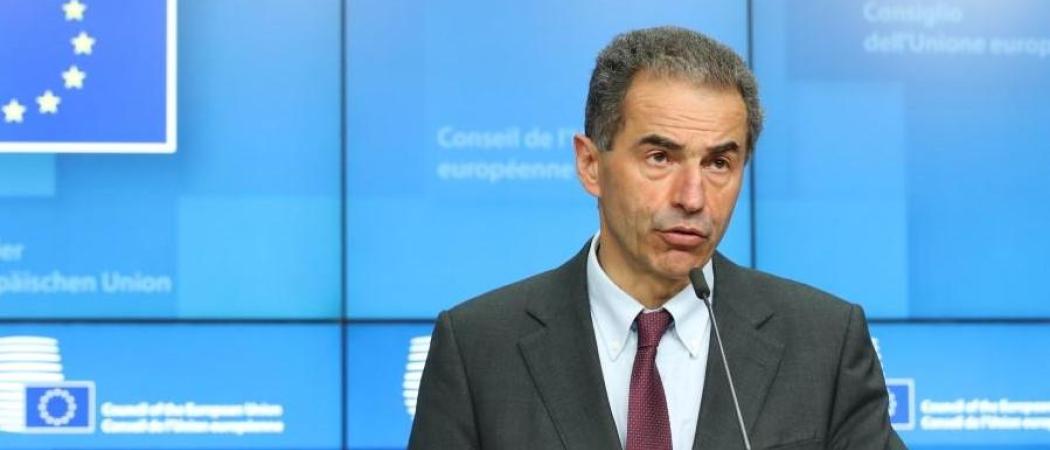The chair of the Commission’s FP10 advisory group says each part of the next Framework Programme should be run by independent councils

Manuel Heitor, chair of the European Commission's high-level group on Horizon Europe and FP10. Photo: Council of the EU
A group of experts tasked with advising the European Commission on the next Framework Programme for research and innovation is recommending a major overhaul of EU funding instruments.
Their report, published today, urges the creation of an independent Industrial Competitiveness and Technology Council and a European Societal Challenges Council to steer collaborative research. That would mean the vast majority of the next programme, provisionally called Framework Programme 10 or FP10, would be managed outside of the Commission.
The group is also urging the overall R&I budget soar to €220 billion from €93.5 billion at present in a major effort to regain lost European competitiveness. It wants “dual-use” military-civilian innovations included, greater cooperation globally (including with China), an overhaul of how the Commission handles its grant paperwork, and much greater independence from Commission bureaucracy for its fundamental research and small-company innovation agencies.
All this by Brussels standards is a pretty radical wish list, that by no means is certain of adoption. But it appears in the midst of debates that could lead to the biggest overhaul of EU R&D funding since the Framework Programme began in 1984. It comes as some officials within the Commission are drawing up plans for even more radical changes, including bundling all R&I funds into an overarching competitiveness fund, as part of the next long-term budget to run from 2028 to 2034.
The group began its work in December 2023 after the Commission selected 15 experts from the worlds of research and industry. Their recommendations are expected to be influential in shaping the Commission’s proposal for FP10, to be presented in mid-2025.
The advisors suggest the final years of Horizon Europe should be used to test their ideas. “Most of these recommendations should be prepared from 2025,” the group’s chair, former Portuguese research minister Manuel Heitor, told Science|Business in an interview ahead of the report’s publication.
More money, “radical” simplification, fewer Widening programmes… Below we summarise each of the group’s recommendations.
Recommendation 1: Create momentum through a whole-of-government approach, aligning a transformative research and innovation policy with the EU strategic agenda and recent high-level policy recommendations
In the time it took the advisory group to conclude its work, three major policy documents have been published: Enrico Letta’s report on the single market, Commission President Ursula von der Leyen’s political guidelines for the upcoming mandate, and Mario Draghi’s report on EU competitiveness. Letta and Draghi are former Italian prime ministers.
In the Heitor group, the advisors “wholeheartedly endorse” these proposals, and say research and innovation policy should be aligned with all three documents.
They cite several specific recommendations including establishing a Research and Innovation Union; continuing to implement the Green Deal; making business easier; making research, innovation and education the fifth freedom of the single market; and promoting disruptive innovation.
Recommendation 2: Make Europe globally competitive, secure, sustainable and resilient through a stronger Framework Programme.
The report offers a stark warning about the consequences of Europe’s underinvestment in research and innovation – public and private RD&I spending in the EU represents 2.2% of GDP, far below competing economies and the long-standing 3% target.
“A well-funded and well-designed FP10 must be a game changer for Europe’s declining competitiveness,” it says. However, EU funding “cannot substitute for low national investment”, and both national and European investments must increase.
The report suggests linking Widening actions – a series of measures aimed to bridge the gap in innovation performance between the EU’s richer and poorer members - to increased national investments, and launching a technology monitoring initiative to invest in the technologies of the future.
Recommendation 3: Deliver European added value through a portfolio focused on four main interrelated and interdependent “spheres” of action
The advisors call for the Horizon Europe budget to be more than doubled to at least €220 billion in FP10 in order to fund all high-quality proposals. This goes beyond the €200 billion requested so far by research lobbyists. This budget should be ringfenced, and should cover the entire RD&I spectrum.
In Horizon 2020, which ran from 2014 to 2020, 74% of proposals rated by independent experts as high quality went unfunded. In the first two years of the current programme, Horizon Europe, the figure was 71%. Extrapolating from those numbers, the group estimated that funding all of those high-quality proposals for a full seven-year programme would cost at least €127 billion more than has actually been budgeted. .
Even a total FP10 budget of €220 billion is unlikely to suffice to fund all excellent projects in FP10, so the report calls on member states to make better use of “Seals of Excellence” to fund high-quality but unsuccessful projects using national or structural funds. This is a label the Commission has been giving highly rated, but unfunded, Horizon Europe project proposals in the hope the member states would cough up the money for them separately. In fact, it seldom works. Heitor says a “lack of trust” prevents the member states from funding projects with a Seal of Excellence.
Spending should be focused on areas where EU programmes have unique added value, such as multi-country collaborations and expensive research and technology infrastructures.
The advisors recommend focusing on four spheres of action: competitive excellence; industrial competitiveness; societal challenges; and a strong R&I ecosystem.
To achieve maximum added value, they propose discontinuing the European Institute of Innovation and Technology’s (EIT) predefined funding. The various EIT knowledge and innovation communities, the big public-private networks aimed spurring more innovation across the EU and are already due to become financially independent, would have to apply for EU funding like other research organisations. They also suggest discontinuing funding for the European Innovation Ecosystems, another networking initiative inside Horizon Europe.
Recommendation 4: Establish an experimental unit to test new programmes, evaluation procedures and instruments
An experimental unit should be set up within the Commission’s research directorate general (DG RTD) to test new assessment methods and funding schemes, including programmes based on the US Advanced Research Projects Agencies (ARPAs), which the Draghi report also calls for.
The ARPA model aims to foster disruptive innovation by giving expert programme managers a large degree of autonomy to select projects and take risks, while projects are actively managed via specific milestones and time commitments.
ARPA programmes should first be tested within the European Innovation Council (EIC), a Horizon Europe programme that funds innovative companies, before potentially being adopted by other parts of the Framework Programme. They should draw on the experiences of similar initiatives such as Germany’s Sprind agency and the UK’s Advanced Research and Invention Agency (ARIA), Heitor said.
The experimental unit should also lead the use of generative artificial intelligence in science. It should test how AI can speed up application processes, while the EU builds an “internal closed data base and GenAI system” for use by reviewers and by EU agencies.
Recommendation 5: Strengthen competitive excellence in Research and Innovation
The report recommends doubling the budget of the European Research Council (ERC), and significantly increasing the budget of the EIC.
It also emphasises the importance of safeguarding the independence of the ERC’s Scientific Council, and ensuring the EIC is similarly protected from pressure from member states or Commission services.
“The uniqueness of the European research, development and innovation system these days has been created, above all, by the European Research Council,” said Heitor. There are no specific recommendations for improving the ERC, as the group felt it was important to preserve its independent decision making.
Regarding the EIC, the Commission should attract private investors to its venture investment arm, the €3.5 billion EIC Fund, to turn it into a 10-year, €30 billion fund.
The Marie Skłodowska-Curie Actions (MSCA), another Horizon Europe programme to fund mobility for doctoral and post-doctoral researchers, should also receive more funding, and its governance model preserved, amid concerns over its future and rumours of a possible merger with Erasmus+, a much larger student-mobility programme that, EU polls suggest, is one of the union’s most popular initiatives
MSCA programmes with industry should be expanded, while a new instrument dubbed ‘Choose Europe’ should be introduced to support young researchers in, or following, their first postdoctoral position, over five years, with hosting institutions committing to advertise an employment position at the end of the funding period.
Recommendation 6: Stimulate industrial RD&I investment in Europe by creating an Industrial Competitiveness and Technology Council
Starting from 2025, the Commission should apply lessons from the ERC and the EIC to launch an independent council to boost private participation in the Framework Programme.
Pillar II of Horizon Europe, which includes large public-private partnerships and thematic “missions”, is currently run by Commission services with the support of member states.
“Our analysis shows that this has become essentially a process to distribute money among member states, and not to build European added value through research and innovation,” Heitor said.
It is “not acceptable” that major innovative firms avoid participating in the Framework Programme as it doesn’t meet their needs or is too bureaucratic, he said. The best way to bring them into the programme is to involve innovators themselves in its governance.
The technology council would be governed by an independent board composed of experts including CEOs or CTOs from industry, and would set the direction for collaborative research, and oversee the sector-specific public-private partnerships that Pillar II funds.
The partnerships themselves should have a stronger focus on industrial competitiveness, and should involve more strategic coordination to reduce duplication, including by phasing out “ineffective” partnerships.
Recommendation 7: Address societal challenges more effectively by creating a Societal Challenges Council
This council would oversee R&I activities related to societal challenges without significant industrial potential. This would include the research component of missions and partnerships, and collaborative research under relevant clusters.
The body would be composed of experts, including from academia, charities, policy and industry.
Societal challenges cover everything from biodiversity loss to ageing societies, but the report suggests focusing on “secure and thriving citizens”.
“A clear example is mental health, which has not been addressed by the pharmaceutical industry at the same level as many other diseases,” Heitor said.
The report also calls for social sciences and humanities to be given a more central role in R&D and the implementation of solutions to societal challenges.
Recommendation 8: Foster an attractive and inclusive RD&I ecosystem in the EU
The advisors also call for action to reverse brain drain, mostly to the US, by improving research career prospects. To do this, the EU should prioritise the development of research and technology infrastructures.
European university alliances should also be strengthened to promote student and researcher mobility, joint degrees, as well as experimenting with joint recruitment of young researchers and joint governance systems across multiple universities.
The report also urges a concentration of current Widening instruments to improve the science and tech capacities of the EU’s newer, mainly east European, members. Widening is a valuable initiative, but it is increasingly characterised by “more and more programs with less and less spending,” said Heitor. “If we have still a low budget, we need to concentrate on the best initiatives, like the teaming or the Marie Curie staff exchange.”
Meanwhile, assessment of the European Semester, the EU’s main policy tool for coordinating economic and fiscal policy across the bloc, should be reformed to consider public and private RD&I spending in member states, including via structural funds.
Recommendation 9: Drive radical simplification, user orientation and efficiency
The expert group calls for a “trust first/evaluate later” application system to tackle administrative complexity. The problem is clearly visible in high administrative costs, with applicants paying up to 12% of their grants in success fees to external consultants, and long delays between calls closing and grant agreements being signed – 278 days in the first years of Horizon Europe.
The proposed reform is “essentially a human resources problem, because it requires programme management, with technical expertise, to follow up the programmes and take a higher risk at the initial assessment phase,” Heitor said in the interview. “It is not easy, but if others are doing it, our proposal is that Europe should also do it.”
Increasingly complex application forms which require applicants to consider the social and economic impact of their proposal call for urgent simplification. The advisors also point to the multiplication of overlapping instruments within the programme.
Other proposals include introducing AI; more open, non-prescriptive calls; and eliminating redundant programmes.
Clusters should evolve to consider synergies between the ERC, EIC, and the two new councils. Partnerships should further leverage cash and in-kind contributions from industry through simplification. Missions should be governed at a high political level, with only the RD&I component remaining in FP10.
During the final three years of Horizon Europe, the proposed experimental unit in DG RTD should work on simplification measures to be ready for FP10. “Many private foundations are speeding up very much their simplification processes, and there is a lot to learn by collaborating with them,” Heitor said.
Recommendation 10: Unleash the power of demand by developing an innovation procurement programme
Another mission of the experimental unit in the Commission would be to test possible public procurement initiatives, in order to incentivise innovation by creating new markets. This should be informed by good practices such as the Defense Advanced Research Projects Agency (DARPA) in the US. DARPA dates back to the early days of the Cold War, and is widely praised – or criticised – for funding the start of what became the Internet, as well as scores of weapons systems such as the first electronic battlefield surveillance and Agent Orange.
“The EU struggles with linking public procurement to support for the development of new solutions and products – referred to as pre-commercial procurement – to a commitment to purchase the final solutions at scale,” the report notes.
It cites decarbonisation, security and defence technologies, and provision of public services including healthcare as fields in which public procurement can stimulate innovation of socially useful solutions.
Recommendation 11: Adopt a nuanced, granular and purpose-driven approach to international cooperation
While ongoing geopolitical tensions require caution when it comes to scientific collaboration, the report’s authors are concerned about “excessive and costly deterioration in European scientific relations with countries that are not fully or formally aligned with the European Union’s interests or values”.
“We need to have a more utilitarian approach to research collaboration, and not just close doors because they are Chinese or they are American,” said Heitor.
He points out that, despite political tensions, the number of co-publications with Chinese researchers has grown significantly in the last two decades. In contrast, EU countries mostly collaborate with each other and with other mature democracies.
The report recommends strengthening cooperation with non-EU countries, and establishing a platform for institutions and member states to share knowledge and coordinate their approaches to complex international partners.
Recommendation 12: Embrace dual use as inevitable by exploiting it both ways
Although most universities and research institutions responded to the Commission’s consultation on allowing dual use projects with civil and military potential in FP10 by defending the current exclusive civil focus, the advisors say dual use should be part of the programme.
They argue that almost all new technologies could be considered dual use. “Instead of trying to identify and classify ‘dual use’, we advocate embracing that it is ubiquitous and inevitable,” they write.
They suggest the Commission should divide programmes between “military RD&I” and “everything else” (including dual use).
Programmes should not use the term “dual use’, and if they do, this should not require extra conditions, while applicants should not be asked to specify future dual use potential, except where legally required.





 A unique international forum for public research organisations and companies to connect their external engagement with strategic interests around their R&D system.
A unique international forum for public research organisations and companies to connect their external engagement with strategic interests around their R&D system.